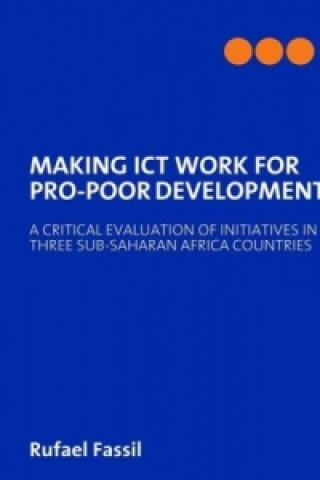
Code: 01778376
MAKING ICT WORK FOR PRO-POOR DEVELOPMENT
by Rufael Fassil
This book is a revised version of a Ph.D. dissertation in which the author presents the results of a comprehensive evaluation of ICT4D initiatives in three Sub Saharan Africa countries. Its starting-point is the apparent failure o ... more
- Language:
 English
English - Binding: Hardback
- Number of pages: 236
Publisher: Books on Demand, 2009
- More about this

37.98 €
RRP: 42.09 €
You save 4.11 €

In stock at our supplier
Shipping in 8 - 10 days
You might also like
-

I Want to Be a Dentist
16.01 € -4 % -

Synthesis of Thiadiazole & Dithiazole Derivatives: A Review
49.36 € -4 %
Give this book as a present today
- Order book and choose Gift Order.
- We will send you book gift voucher at once. You can give it out to anyone.
- Book will be send to donee, nothing more to care about.
More about MAKING ICT WORK FOR PRO-POOR DEVELOPMENT
You get 95 loyalty points
 Book synopsis
Book synopsis
This book is a revised version of a Ph.D. dissertation in which the author presents the results of a comprehensive evaluation of ICT4D initiatives in three Sub Saharan Africa countries. Its starting-point is the apparent failure of ICT4D initiatives in Sub Saharan Africa to deliver for human development goals. As a result, there has been a growing demand for more rigorous empirical evidence about the ways in which individuals and communities exploit access to and use of ICT, and the impact they have on the livelihoods of marginalized communities in rural and urban areas. The lack of empirical evidence in this area inhibits effective analysis of the factors enabling or constraining ICT4D initiatives outcomes and means that scarce development resources may be ineffectively deployed or opportunities for effective pro-poor initiatives are being missed, and it is one of the key aims of this book to explore the key critical success factors for making ICT work for pro-poor development in Sub Saharan Africa.Using a comprehensive quantitative and qualitative design, this evaluation study examined the promise of ICT to deliver for human development goals at the macro, meso and micro-level over a decade (1995-2006) in Ethiopia, Kenya and South Africa. The exploration was carried out using new hybrid evaluation framework called a Capability Oriented Logical Framework Approach (CO-LFA) that was developed by the author. This framework places, in contrast to the current discourse around the digital divide , pro-poor sustainable development and not technology at the centre of the analysis.Findings from the study clearly conform the central hypothesis that access to and use of ICT in Sub-Saharan Africa often fail to meet pro-poor development goals, because they are impaired by deficiencies in the enabling environment that are systematically embedded in the broader socio-economic context of the targeted communities. The author draws conclusions that may have implications for making ICT work for pro-poor development, in terms of assumptions, approaches and outcomes.
 Book details
Book details
37.98 €
- Full title: MAKING ICT WORK FOR PRO-POOR DEVELOPMENT
- Subtitle: A CRITICAL EVALUATION OF INITIATIVES IN THREE SUB-SAHARAN AFRICA COUNTRIES
- Author: Rufael Fassil
- Language:
 English
English - Binding: Hardback
- Number of pages: 236
- EAN: 9783833495885
- ID: 01778376
- Publisher: Books on Demand
- Weight: 500 g
- Dimensions: 220 × 155 × 18 mm
- Published: 2009
Trending among others
-

The Book of Bill
23.77 € -14 % -

Gravity Falls Journal 3
16.41 € -23 % -

Berserk Deluxe Volume 1
44.32 € -11 % -

Pumpkin Spice Cafe
11.68 € -18 % -

Berserk Deluxe Volume 2
52.18 € -

White Nights
3.52 € -23 % -

It ends with us
8.96 € -30 % -

48 Laws Of Power
18.03 € -29 % -

A Little Life
17.52 € -

Atomic Habits
15.91 € -14 % -

Gilmore Girls: The Official Advent Calendar
28.91 € -25 % -

Berserk Deluxe Volume 3
48.76 € -3 % -

Jujutsu Kaisen, Vol. 23
9.66 € -26 % -

Surrounded by Idiots
10.47 € -29 % -

The 48 Laws of Power
24.57 € -5 % -

The Official Stardew Valley Cookbook
22.36 € -22 % -

Berserk Deluxe Volume 4
45.23 € -10 % -

A Good Girl's Guide to Murder
8.15 € -25 % -

Iron Flame
16.21 € -18 % -

A Curse For True Love
10.37 € -12 % -

Berserk Deluxe Volume 5
50.47 € -

It Starts with Us
8.96 € -16 % -

Twisted Love
9.76 € -24 % -

Powerless
10.47 € -18 % -

The Husky and His White Cat Shizun: Erha He Ta de Bai Mao Shizun (Novel) Vol. 6
16.21 € -19 % -

English File: Intermediate: Student's Book with Online Practice
25.58 € -7 % -

Twisted Hate
10.17 € -20 % -

Court of Mist and Fury
9.36 € -18 % -

Twisted Lies
9.76 € -24 % -

Chainsaw Man, Vol. 16
10.77 € -18 % -

Psychology of Money
18.83 € -4 % -

Berserk Deluxe Volume 6
51.17 € -

Reckless
10.27 € -20 % -

Twisted Games
9.76 € -17 % -

Gravity Falls: Lost Legends
17.72 € -15 % -

English File Upper Intermediate Student's Book with Student Resource Centre Pack (4th)
36.36 € -6 % -

Everything I Know About Love
10.37 € -29 % -

Court of Thorns and Roses Paperback Box Set (5 books)
49.96 € -20 % -

Vagabond (VIZBIG Edition), Vol. 1
24.57 € -

Headway: Elementary: Student's Book with Online Practice
24.98 € -7 % -

Court of Thorns and Roses
9.26 € -19 % -

Meow
20.75 € -

Headway: Elementary: Workbook Without Key
14 € -

Once Upon A Broken Heart
10.67 € -17 % -

A Court of Wings and Ruin
10.77 € -6 % -

SOLO LEVELING V09
17.72 € -15 % -

The Courage To Be Disliked
10.97 € -14 % -

The Ballad of Never After
10.17 € -20 % -

A Court of Silver Flames
10.17 € -20 %
Collection points Bratislava a 2642 dalších
Copyright ©2008-24 najlacnejsie-knihy.sk All rights reservedPrivacyCookies


 15549 collection points
15549 collection points Delivery 2.99 €
Delivery 2.99 € 02/210 210 99 (8-15.30h)
02/210 210 99 (8-15.30h)